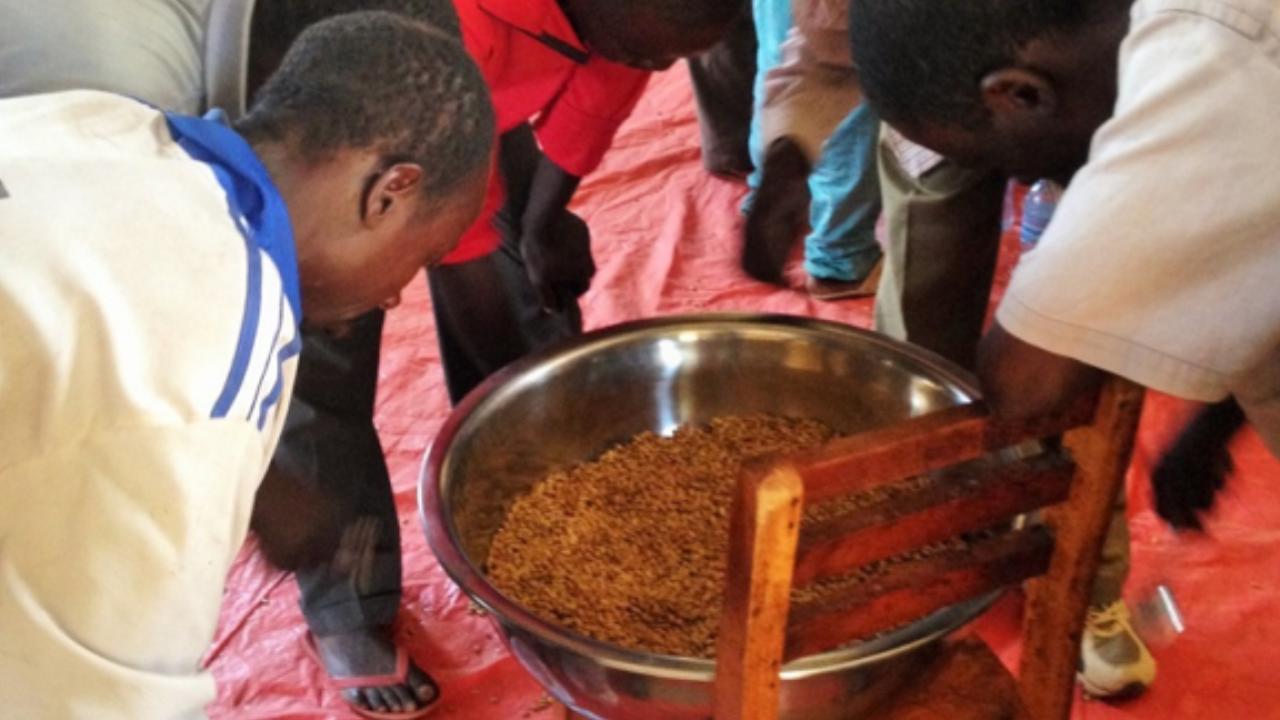
What Buckets of Beans Can Tell Us About Fishery Co-Management
In a game to simulate fishery co-management in Tanzania, groups of five fishers holding spoons and buckets stood around bins of beans. The buckets represented their boats, and the bins were bodies of water. The beans were fish.
In 2014 and 2015, a team of researchers from the Feed the Future Innovation Lab for Assets and Market Access used this basic setup to explore the cooperative and competitive strategies involved in fishery co-management. They found that regulations and the threat of punishment in most cases led to stock collapse, which could have implications for the real-world resource these fishers rely on for their livelihoods.
“By focusing the game on penalizing those who use illegal gear, it distracted players from sustaining the resource, and they responded by increasing their harvest rates,” writes the team of researchers led by Yaniv Stopnitzky in a new policy brief detailing the study’s findings. Stopnitzky is an assistant professor of economics at the University of San Francisco.
Simulating Fishery Co-Management in Developing Economies
Healthy fish stocks are a vital community resource for 38 million fishers worldwide, about 90 percent of which are small-scale. Lacking the resources to support centralized regulations, governments in developing economies often use fishery co-management systems that turn over some of the roles and responsibilities of managing fisheries to collectives of small-scale fishers who depend on healthy stocks.
For this study, the research team developed a dynamic fishery co-management simulation in Tanzania to learn more about how well these kinds of systems can work and the kinds of decisions they motivate among fishers. The study took place in randomly selected villages in Mafia Island and Ukerewe, the two most important fishing districts in Tanzania.
In up to 10 half-minute rounds, the players stood around a bin and used spoons to scoop beans into their buckets. Between rounds, the researchers weighed each player’s bucket and calculated the amount left in the bin. They also increased the “fish stock” to mirror the way that actual fish populations grow or recover over time.
The players participated in one of three variations of the game. The first included only harvesting. The second included the option to use “illegal fishing gear.” In this game, a player could secretly indicate to the game’s moderator he would use illegal gear that round. At the end of the round, the moderator would double that fisher’s harvest and remove the same amount from the bin. The other fishers would know that someone had cheated but never who had done it.
The third variation included the possibility of being caught in a “patrol,” as well as the option for the other players to punish whomever was caught. In this game, each fisher had a 10 percent chance of having their choice of gear, legal or illegal, revealed to the group.
Even though this was a game, the fishers who participated could earn as much in cash as they would by having their boats out on the water. They earned TSh 2,000 (about $1.17) per 1,000 grams of “fish.” The average payout was about equivalent to the fishers’ average daily earnings.
Threat of Enforcement Creates Higher Likelihood of Stock Collapse
Fishers playing the games that included the option to use illegal gear and patrols harvested faster despite seeing the shared stock of beans visibly deplete between rounds. In the game with patrols, which carried the risk of being caught cheating, fishers were 50 percent more likely than those in the harvest-only game to collapse the stocks completely.
The researchers noted that these unintended consequences were not driven by higher rates of cheating, even though the fishers knew they were unlikely to get caught. When players had the option to cheat, they only did eight percent of the time at most. Punishment was also not a factor; in all the rounds that were played across this study, a player was only punished for cheating once.
“Our results suggest that enforcement mechanisms can actually damage cooperative behavior as players shift from cooperative harvest strategies to more self-interested ones that lead to the collapse of the shared resource,” the research team write.
While the team makes clear that this study alone can’t explain definitively why the fishers played the game this way (ending up with these outcomes), they suggest it may be that regulation and enforcement themselves “crowded out” cooperative strategies by encouraging this self-interested behavior. They could also focus fishers' attention on immediate gains at the expense of long-term sustainability.
The idea of “crowding out” has been suggested in a number of other experimental studies to help explain how people make decisions on resources and conservation. If this is in fact the case for fishery co-management, encouraging better cooperation and shared responsibility could limit self-interest and its consequences.
This post first appeared on Agrilinks.org.
Media contact:
Alex Russell, (530) 752-4798, parussell@ucdavis.edu
